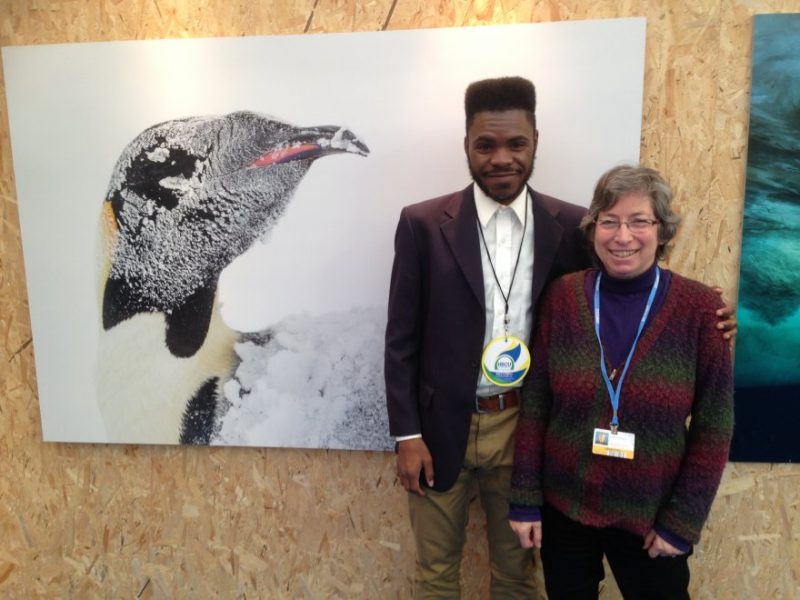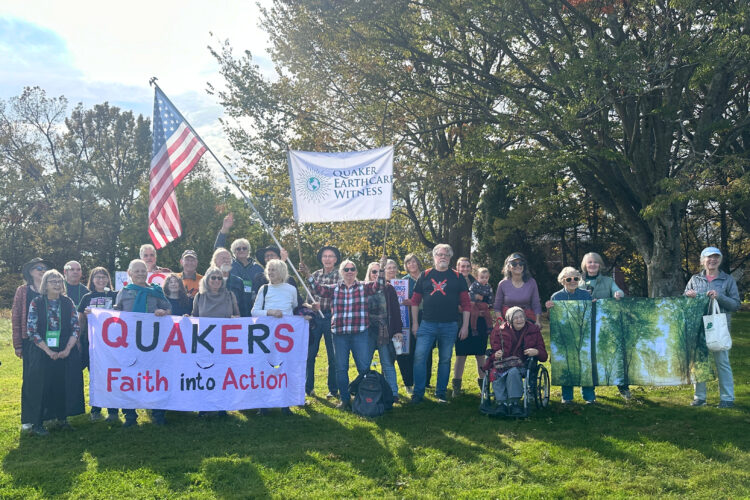Climate Justice—from Katrina to Paris and Back to New Orleans

By Shelley Tanenbaum.
When we talk about how global warming will affect the poorest and most vulnerable people on the planet, or when we talk about how countries that have historically emitted the most carbon have a greater carbon debt than those with smaller carbon footprints, or how polluting industries are nearly always located in poorer areas and usually in communities of color, we are talking about climate justice. A group of climate justice activists from Historically Black Colleges and Universities (HBCUs) attended COP21, the conference that resulted in the Paris Agreement on climate change, to raise their voices in the global community. Fifty students, faculty, and advisors from 15 colleges and institutions attended; it was their largest delegation to a COP ever.
I (Shelley) met a few members of the HBCU delegation when we attended a side-event with a panel on interfaith climate change activism. Isaac Wilkins from Howard University asked the panel to comment on climate justice. All the panelists brushed aside his question, so afterwards I introduced myself to Isaac and we met later to talk about how faith-based groups can support climate justice. I was very disappointed to get so little response from the panelists: how could people of faith have nothing to offer? How can Friends use our influence in interfaith settings and within our own Meetings to advance the discussion and change policies that disproportionately impact poorer people and communities of color?
In our meeting at the COP and a follow-up in January, Isaac shared some of his thoughts.
1. Why did you attend the COP21 as a part of the HBCU delegation? What were the highlights for you and the delegation? What were the disappointments?
Isaac: I attended COP21 as an HBCU delegate because I saw an opportunity to raise awareness about environmental issues happening in America. By being present at the conference not only would I be raising awareness but I would be advocating for loss and damage and stronger adaptation rules to be implemented in the agreement. Also I saw this as a great opportunity for me to learn about the different issues people were facing in other countries due to climate change as well as the inventions and strategies they are taking to address climate change.
A highlight for myself and the delegation would have been when we organized a panel/group discussion at a university in the south of France. The event brought people of many different races, ages, and countries together to come up with a blueprint on how we, as educated climate activists, can inspire the masses and bridge the gap of information pertaining to climate change. I wish that all members of the delegation would have had access to the “blue zone” where the negotiations were happening so that they could not only learn the process of international negotiation but also learn about the different innovations being done by other countries, non-profits, and companies [Note: the blue zone at the COP was restricted to delegates, observers, and press with special passes].
2. What is the HBCU delegation? Why is it important for black students to work on climate justice?
Isaac: It is important for black students to work on climate justice because there is little representation of blacks and other minorities within the field of climate justice. I think it is our job to advocate for ourselves, especially since sometimes people are not aware of the climate injustices that are happening in our communities. I think that climate injustices happen among a variety of classes/races and I think that each class should use their voice and mobilize and raise awareness of the issue. I believe that the area of climate change and injustice is very broad and sometimes, unintentionally, a group and their issue are not represented. The HBCU delegation is full of educated and aware advisors, students, and respected environmental experts (such as Dr. Bullard and Dr. Wright), who have accepted the mission of advocating for justice.
3. What kind of activism is happening on the Howard campus?
Isaac: Howard University’s student body is full of activists. For the past year we have mobilized a campaign around divesting from fossil fuels and having an understanding of how our tuition is being spent, especially due to certain conditions of the university. Also, we are trying to increase the number of recyclable initiatives and clean water systems around the campus. A long term goal for eco-friendly student activists is for the school to invest in clean shuttle buses for students, to serve as our contribution to the decrease of greenhouse gasses. It is our hope that we can create a strong mechanism for decreasing greenhouse gasses and that it be adopted by other universities nationwide.
4. How would you like to see communities of faith be a part of the climate justice movement?
Isaac: Churches and faith communities have served as the platform for change since the beginning of time. For example, during the civil rights movement, the church served as a platform to mobilize, aid, and educate people regarding the major issue of civil rights. Many different faiths were able to come together and fight for change. Pertaining to climate change, I believe that churches should use their influence to educate people on the seriousness of climate change and to promote eco-friendly strategies to cope with the climate changes. Faith groups can create awareness of multiple avenues that saints can take toward the change. The Roman Catholic church, Quakers, Christians, and other faith groups have always had a strong influence in politics and on people.

